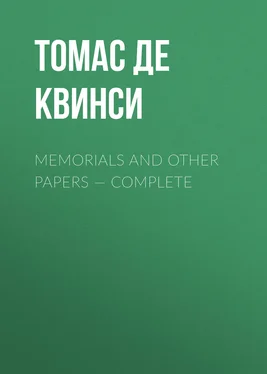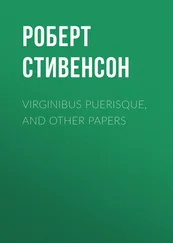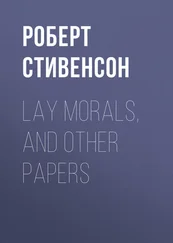Томас Де Квинси - Memorials and Other Papers — Complete
Здесь есть возможность читать онлайн «Томас Де Квинси - Memorials and Other Papers — Complete» — ознакомительный отрывок электронной книги совершенно бесплатно, а после прочтения отрывка купить полную версию. В некоторых случаях можно слушать аудио, скачать через торрент в формате fb2 и присутствует краткое содержание. Жанр: foreign_prose, literature_19, foreign_antique, на английском языке. Описание произведения, (предисловие) а так же отзывы посетителей доступны на портале библиотеки ЛибКат.
- Название:Memorials and Other Papers — Complete
- Автор:
- Жанр:
- Год:неизвестен
- ISBN:нет данных
- Рейтинг книги:5 / 5. Голосов: 1
-
Избранное:Добавить в избранное
- Отзывы:
-
Ваша оценка:
- 100
- 1
- 2
- 3
- 4
- 5
Memorials and Other Papers — Complete: краткое содержание, описание и аннотация
Предлагаем к чтению аннотацию, описание, краткое содержание или предисловие (зависит от того, что написал сам автор книги «Memorials and Other Papers — Complete»). Если вы не нашли необходимую информацию о книге — напишите в комментариях, мы постараемся отыскать её.
Memorials and Other Papers — Complete — читать онлайн ознакомительный отрывок
Ниже представлен текст книги, разбитый по страницам. Система сохранения места последней прочитанной страницы, позволяет с удобством читать онлайн бесплатно книгу «Memorials and Other Papers — Complete», без необходимости каждый раз заново искать на чём Вы остановились. Поставьте закладку, и сможете в любой момент перейти на страницу, на которой закончили чтение.
Интервал:
Закладка:
……………..
189 19. Worcester "
……………..
231
Then, besides these colleges, five Halls , as they are technically called, (the term Hall implying chiefly that they are societies not endowed, or not endowed with fellowships as the colleges are), namely:
Mem. 1. St. Mary Hall.
…………..
83 2. Magdalen "
…………..
178 3. New Inn "
…………..
10 4. St. Alban "
…………..
41 5. St. Edmund "
…………..
96
Such being the names, and general proportions on the scale of local importance, attached to the different communities, next comes the very natural question, What are the chief determining motives for guiding the selection amongst them? These I shall state. First of all, a man not otherwise interested in the several advantages of the colleges has, however, in all probability, some choice between a small society and a large one; and thus far a mere ocular inspection of the list will serve to fix his preference. For my part, supposing other things equal, I greatly preferred the most populous college, as being that in which any single member, who might have reasons for standing aloof from the general habits of expense, of intervisiting, etc., would have the best chance of escaping a jealous notice. However, amongst those "other things" which I presumed equal, one held a high place in my estimation, which a little inquiry showed to be very far from equal. All the colleges have chapels, but all have not organs; nor, amongst those which have, is the same large use made of the organ. Some preserve the full cathedral service; others do not. Christ Church, meantime, fulfilled all conditions: for the chapel here happens to be the cathedral of the diocese; the service, therefore, is full and ceremonial; the college, also, is far the most splendid, both in numbers, rank, wealth, and influence. Hither I resolved to go; and immediately I prepared to call on the head.
The "head," as he is called generically, of an Oxford college (his specific appellation varies almost with every college— principal, provost, master, rector, warden, etc.), is a greater man than the uninitiated suppose. His situation is generally felt as conferring a degree of rank not much less than episcopal; and, in fact, the head of Brazennose at that time, who happened to be the Bishop of Bangor, was not held to rank much above his brothers in office. Such being the rank of heads generally, a fortiori , that of Christ Church was to be had in reverence; and this I knew. He is always, ex officio , dean of the diocese; and, in his quality of college head, he only, of all deans that ever were heard of, is uniformly considered a greater man than his own diocesan. But it happened that the present dean had even higher titles to consideration. Dr. Cyril Jackson had been tutor to the Prince of Wales (George IV.); he had repeatedly refused a bishopric; and that , perhaps, is entitled to place a man one degree above him who has accepted one. He was also supposed to have made a bishop, and afterwards, at least, it is certain that lie made his own brother a bishop. All things weighed, Dr. Cyril Jackson seemed so very great a personage that I now felt the value of my long intercourse with great Dons in giving me confidence to face a lion of this magnitude.
Those who know Oxford are aware of the peculiar feelings which have gathered about the name and pretensions of Christ Church; feelings of superiority and leadership in the members of that college, and often enough of defiance and jealousy on the part of other colleges. Hence it happens that you rarely find yourself in a shop, or other place of public resort, with a Christ-Church man, but he takes occasion, if young and frivolous, to talk loudly of the Dean, as an indirect expression of his own connection with this splendid college; the title of Dean being exclusively attached to the headship of Christ Church. The Dean, as may be supposed, partakes in this superior dignity of his "House;" he is officially brought into connection with all orders of the British aristocracy—often with royal personages; and with the younger branches of the aristocracy his office places him in a relation of authority and guardianship—exercised, however, through inferior ministry, and seldom by direct personal interference. The reader must understand that, with rare exceptions, all the princes and nobles of Great Britain, who choose to benefit by an academic education, resort either to Christ Church College in Oxford, or to Trinity College in Cambridge; these are the alternatives. Naturally enough, my young friends were somewhat startled at my determination to call upon so great a man; a letter, they fancied, would be a better mode of application. I, however, who did not adopt the doctrine that no man is a hero to his valet, was of opinion that very few men indeed are heroes to themselves. The cloud of external pomp, which invests them to the eyes of the attoniti cannot exist to their own; they do not, like Kehama, entering the eight gates of Padalon at once, meet and contemplate their own grandeurs; but, more or less, are conscious of acting a part. I did not, therefore, feel the tremor which was expected of a novice, on being ushered into so solemn a presence.
II.
OXFORD
The Dean was sitting in a spacious library or study, elegantly, if not luxuriously furnished. Footmen, stationed as repeaters, as if at some fashionable rout, gave a momentary importance to my unimportant self, by the thundering tone of their annunciations. All the machinery of aristocratic life seemed indeed to intrench this great Don's approaches; and I was really surprised that so very great a man should condescend to rise on my entrance. But I soon found that, if the Dean's station and relation to the higher orders had made him lofty, those same relations had given a peculiar suavity to his manners. Here, indeed, as on other occasions, I noticed the essential misconception, as to the demeanor of men of rank, which prevails amongst those who have no personal access to their presence. In the fabulous pictures of novels (such novels as once abounded), and in newspaper reports of conversations, real or pretended, between the king and inferior persons, we often find the writer expressing his sense of aristocratic assumption, by making the king address people without their titles. The Duke of Wellington, for instance, or Lord Liverpool, figures usually, in such scenes, as "Wellington," or "Arthur," and as "Liverpool." Now, as to the private talk of George IV. in such cases, I do not pretend to depose; but, speaking generally, I may say that the practice of the highest classes takes the very opposite course. Nowhere is a man so sure of his titles or official distinctions as amongst them
Конец ознакомительного фрагмента.
Текст предоставлен ООО «ЛитРес».
Прочитайте эту книгу целиком, купив полную легальную версию на ЛитРес.
Безопасно оплатить книгу можно банковской картой Visa, MasterCard, Maestro, со счета мобильного телефона, с платежного терминала, в салоне МТС или Связной, через PayPal, WebMoney, Яндекс.Деньги, QIWI Кошелек, бонусными картами или другим удобным Вам способом.
Интервал:
Закладка:
Похожие книги на «Memorials and Other Papers — Complete»
Представляем Вашему вниманию похожие книги на «Memorials and Other Papers — Complete» списком для выбора. Мы отобрали схожую по названию и смыслу литературу в надежде предоставить читателям больше вариантов отыскать новые, интересные, ещё непрочитанные произведения.
Обсуждение, отзывы о книге «Memorials and Other Papers — Complete» и просто собственные мнения читателей. Оставьте ваши комментарии, напишите, что Вы думаете о произведении, его смысле или главных героях. Укажите что конкретно понравилось, а что нет, и почему Вы так считаете.












